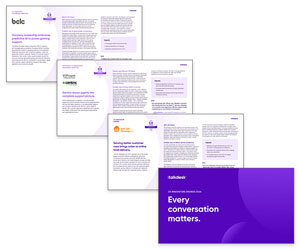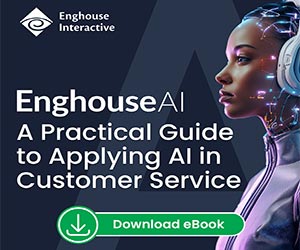What impact is AI having on knowledge management? Is it changing contact centres for the better? Or are the benefits few and far between?
To find out, we asked our panel of experts to share their top 10 examples of how AI is making it quicker and easier for agents to find the correct information they need, exactly when they need it.
So, here’s a quick round-up of what AI is now capable of…
1. Identifying and Merging Duplicate Content

AI’s ability to recognize patterns and similarities in data entries helps in identifying and merging duplicate content, streamlining the information repository.
Consequently, employees can find and retrieve accurate information quickly, enhancing productivity and reducing the time spent on administrative tasks.
Contributed by: Tatiana Polyakova, COO, MiaRec
2. Offering Agents a Helping Hand During Trickier Conversations
By using real-time analytics, agents can be offered a helping hand during trickier conversations – such as providing links to knowledge base content like competitive battlecards – boosting agent confidence, as well as reducing repeat contact and AHT.
These tricky conversations and how they are navigated can also be used as lessons learnt in the future, helping to improve internal knowledge and performance.
Contributed by: Frank Sherlock, VP of International, CallMiner
3. Generating Search Page Summaries for a Better User Experience

Like the new Google search AI overviews, generative summaries and responses can be offered on a search page for a better user experience and reduced effort.
This instant access to answers, without needing to click onto new pages or navigate back and forth, can be paired with a rating system.
Highly rated responses can be flagged for review to determine if they should be added to the knowledge base.
This knowledge may already exist but could be more digestible and usable in a new format or with new phrasing.
This continuous improvement cycle helps ensure knowledge bases remain relevant, comprehensive, and user-friendly.
Contributed by: Agam Kohli, Sales Engineering Director, Odigo UK
4. Suggesting Updates to Outdated Information
Keeping a knowledge management system up to date is a time-consuming process that often requires significant manual effort.
AI can streamline this by analysing patterns in customer enquiries and feedback to identify outdated information and suggest updates.
AI algorithms can pull from internal documents, recent communications, and even external sources to recommend accurate and up-to-date content.
This reduces the effort needed to maintain the knowledge base and ensures employees and customers have access to the latest information.
Contributed by: Tatiana Polyakova, COO, MiaRec
5. Curating Information Into a Consistent Customer-Facing Format

Organizations can use AI to build and maintain their knowledge base, dynamically converting verified data sources and curating information to the required, customer-facing format, helping ensure content is current, consistent and accurate.
Meanwhile natural language processing (NLP) and generative AI can enhance the search and processing of queries – generating precise, personalized real-time responses instantly, enabling faster agent replies.
Contributed by: Dane Smith, Global Learning and Development Manager, Enghouse Interactive
6. Instantly Pulling Relevant Information for Agents (and Speeding Up Time to Resolution)

AI eliminates employees’, chatbots’ and consumers’ need to search through a knowledge management system by pulling the relevant information instantly – speeding up the time to resolution.
It’s important to note that the AI needs to be purpose-built and trained on industry- and organization-specific CX data.
This enables the AI to effectively improve knowledge management systems.
Contributed by: Elizabeth Tobey, Head of Marketing Digital & AI, NICE
7. Learning From Past Searches to Provide More Accurate Results Over Time
AI can learn from past searches to provide more accurate results over time. By recognizing the intent behind queries, AI delivers precise answers, reducing the time spent searching for information.
These algorithms continuously refine search capabilities based on user interactions, leading to a more intuitive and responsive system. AI can also suggest related topics and resources, offering a comprehensive view of the available knowledge.
This not only enhances user experience but also boosts productivity by ensuring that employees and customers have immediate access to the information they need.
Contributed by: Tatiana Polyakova, COO, MiaRec
8. Identifying Common Questions and Issues

Data is aplenty within the contact centre, but many struggle with putting the insights into action.
By using AI-driven technology, organizations can analyse customer interactions to identify common questions and issues, allowing continual improvement of the internal knowledge base.
This means resources stay accurate, relevant and helpful, reducing the time agents spend searching for answers.
Contributed by: Frank Sherlock, VP of International, CallMiner
9. Automating the Process of Categorizing Knowledge Articles
AI takes manual work – like sifting, sorting and categorizing knowledge articles – out of knowledge management. AI automates the entire process.
The magic formula is AI and an interaction-centric cloud platform. This puts all the critical CX information in one place, making it easy to manage.
Contributed by: Elizabeth Tobey, Head of Marketing Digital & AI, NICE
10. Pushing Personalized Knowledge Recommendations to Agents
AI can deliver personalized knowledge recommendations and proactively push relevant information
AI can deliver personalized knowledge recommendations and proactively push relevant information to employees and customers based on their roles, past interactions, and current trends.
This ensures users receive the most pertinent information without having to sift through unnecessary content.
It also helps predict common customer issues and ensures support agents have the necessary information ready.
Contributed by: Tatiana Polyakova, COO, MiaRec
Implementing AI in Knowledge Management Is Not a ‘Once and Done’ Task
Contact centres should be mindful that implementing AI in knowledge management is not a ‘once and done’ task.
It requires a continuous commitment to training and refining the AI system based on actual usage and feedback, as Dane Smith, Global Learning and Development Manager, Enghouse Interactive, explains:
“Contact centres must invest in necessary resources and establish robust processes for capturing and integrating agent activity and feedback regarding the AI’s performance and the accuracy of the knowledge provided.
Regular analysis, reviews and updates are vital to ensure that the KMS remains adaptable to changes in customer queries and information updates.”
For more great insights and advice from our panel of experts, read these articles next:
- Is Your Scheduling in Need of an Overhaul? Try These 8 Top Tips
- 10 Changes Set to Redefine the Future of Self-Service
- How to Stop Call Transfers Ruining Your CX
Author: Robyn Coppell
Reviewed by: Xander Freeman
Published On: 12th Aug 2024 - Last modified: 13th Aug 2024
Read more about - Technology, Agam Kohli, Artificial Intelligence, CallMiner, Dane Smith, Elizabeth Tobey, Enghouse Interactive, Frank Sherlock, Knowledge Management, MiaRec, NICE, Odigo, Tatiana Polyakova, Top Story









































